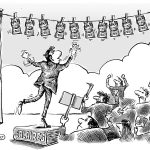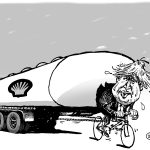A patent race… to generosity
The temporary lifting of patent protections for anti-Covid vaccines scares markets, without convincing of its effectiveness.
By taking sides in favour of the temporary lifting of patent protections for anti-covid vaccines, did President Joe Biden have generous Dr. Salk in mind? Discoverer of the polio vaccine, he refused to patent his invention – for a shortfall, estimated at several billion dollars at the time – and donated it to the world in order to eradicate this evil.
Can this saga, exemplary in many ways, help to inform the current debate and allow us to assess whether this option would indeed be the best way to speed up the spread of vaccination against the current pandemic. Nothing is less certain.
Since last fall, India and South Africa, supported by many NGOs, have argued that large-scale, low-cost distribution of new vaccines would be the only way to countain the pandemic. This lifting of patents would be all the more legitimate since the work of the laboratories concerned has been heavily subsidised by the States and is the result of academic research, which they would therefore not have directly funded. Similarly, the small number of producers would have fostered a supply race that only countries with the means to pay could take away. He pointed out that the partial lifting of HIV treatment fees has lowered the price.
For vaccine intellectual property advocates, the lifting of patents would set an unwelcome and counterproductive precedent.
For vaccine intellectual property advocates – the pharma giants obviously supported by producing countries, but not only – the pandemic would not justify such changes in international trade rules, which would set an unwelcome and counterproductive precedent. Their arguments are no less admissible. For these, the issue is less about patent ownership than about actual production capacity and control of industrial manufacturing processes. The lack of raw materials, and supplies, already felt upstream of production lines, could only increase. The race for components, the risk of counterfeits, would only lead to price increases and a lasting loss of confidence in the products.
Finally, the lifting of technological secrets of such importance would only discourage any innovation and, for the United States in particular, to give up a whole swath of its leadership in this field. In America, the frantic race to make the polio vaccine in its time caused a number of casualties due to the defectiveness of some of the inoculated products [1], which delayed the nationwide vaccination campaign. Today, large laboratories are signing production agreements in several countries, with which they intend to deploy their production capacity.
The rise of the Covax programme under the aegis of WHO should certainly be everyone’s priority.
Putting health emergency in the fore, however generous, is not always without ulterior motives and not all countries are housed in the same way. India, facing the ravages of a new pandemic wave, has significant and proven production capacity that would allow it to establish itself in the generic markets. Does it not now play a central role in the counter-measures strategy against China in Asia as in Africa?
Until an agreement is reached, the development of the Covax programme under the aegis of WHO should certainly be everyone’s priority.
[1] Cutter Laboratories Case
Published in French in allnews.ch on May – 25th 2021 Cartoon © Barrett



